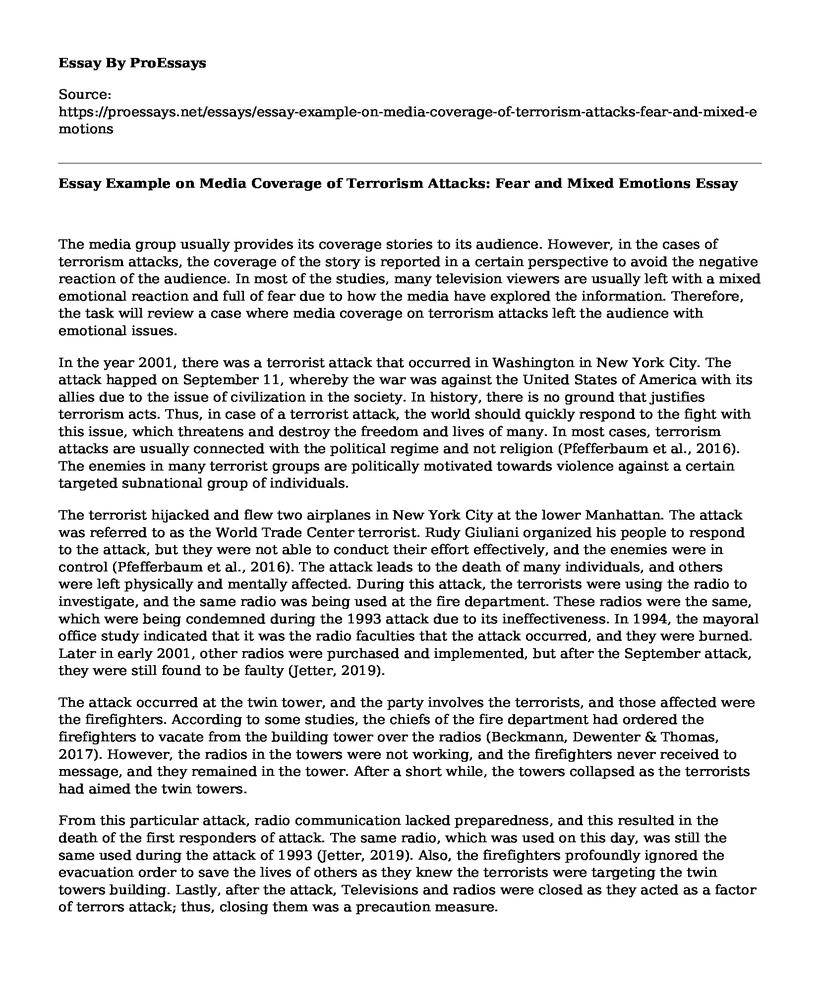The media group usually provides its coverage stories to its audience. However, in the cases of terrorism attacks, the coverage of the story is reported in a certain perspective to avoid the negative reaction of the audience. In most of the studies, many television viewers are usually left with a mixed emotional reaction and full of fear due to how the media have explored the information. Therefore, the task will review a case where media coverage on terrorism attacks left the audience with emotional issues.
In the year 2001, there was a terrorist attack that occurred in Washington in New York City. The attack happed on September 11, whereby the war was against the United States of America with its allies due to the issue of civilization in the society. In history, there is no ground that justifies terrorism acts. Thus, in case of a terrorist attack, the world should quickly respond to the fight with this issue, which threatens and destroy the freedom and lives of many. In most cases, terrorism attacks are usually connected with the political regime and not religion (Pfefferbaum et al., 2016). The enemies in many terrorist groups are politically motivated towards violence against a certain targeted subnational group of individuals.
The terrorist hijacked and flew two airplanes in New York City at the lower Manhattan. The attack was referred to as the World Trade Center terrorist. Rudy Giuliani organized his people to respond to the attack, but they were not able to conduct their effort effectively, and the enemies were in control (Pfefferbaum et al., 2016). The attack leads to the death of many individuals, and others were left physically and mentally affected. During this attack, the terrorists were using the radio to investigate, and the same radio was being used at the fire department. These radios were the same, which were being condemned during the 1993 attack due to its ineffectiveness. In 1994, the mayoral office study indicated that it was the radio faculties that the attack occurred, and they were burned. Later in early 2001, other radios were purchased and implemented, but after the September attack, they were still found to be faulty (Jetter, 2019).
The attack occurred at the twin tower, and the party involves the terrorists, and those affected were the firefighters. According to some studies, the chiefs of the fire department had ordered the firefighters to vacate from the building tower over the radios (Beckmann, Dewenter & Thomas, 2017). However, the radios in the towers were not working, and the firefighters never received to message, and they remained in the tower. After a short while, the towers collapsed as the terrorists had aimed the twin towers.
From this particular attack, radio communication lacked preparedness, and this resulted in the death of the first responders of attack. The same radio, which was used on this day, was still the same used during the attack of 1993 (Jetter, 2019). Also, the firefighters profoundly ignored the evacuation order to save the lives of others as they knew the terrorists were targeting the twin towers building. Lastly, after the attack, Televisions and radios were closed as they acted as a factor of terrors attack; thus, closing them was a precaution measure.
Conclusion
In conclusion, media coverage cannot always be blamed for the terror attack. Most of the terrorist teams usually use media to accomplish their mission, but people should stop the unfortunate stereotypes and perceptions about it. Although, after an attack, many people are left with attitudinal and emotional reactions, they should be able to deal with media exposure.
References
Beckmann, K. B., Dewenter, R., & Thomas, T. (2017). Can news draw blood? The impact of media coverage on the number and severity of terror attacks. Peace Economics, Peace Science and Public Policy, 23(1).
Jetter, M. (2019). More bang for the buck: Media coverage of suicide attacks. Terrorism andpolitical violence, 31(4), 779-799.
Pfefferbaum, B., Nitiema, P., Pfefferbaum, R. L., Houston, J. B., Tucker, P., Jeon-Slaughter, H., & North, C. S. (2016). Reactions of Oklahoma City bombing survivors to media coverage of the September 11, 2001, attacks. Comprehensive psychiatry, 65, 70-78.
Jetter, M. (2019). More bang for the buck: Media coverage of suicide attacks. Terrorism and political violence, 31(4), 779-799.
Cite this page
Essay Example on Media Coverage of Terrorism Attacks: Fear and Mixed Emotions. (2023, May 23). Retrieved from https://proessays.net/essays/essay-example-on-media-coverage-of-terrorism-attacks-fear-and-mixed-emotions
If you are the original author of this essay and no longer wish to have it published on the ProEssays website, please click below to request its removal:
- Research Paper on Moulin Rouge
- Sustainable Design of Skyscrapers
- Sturgill Simpson: Singer, Songwriter, Grammy Winner, Mercury in Retrograde - Essay Sample
- Asian Americans: Representation in U.S. Media and Its Impact - Essay Sample
- Essay Example on the Rise of Gender Relations: An Analysis of Kinship to Kingship
- Essay Example on Smartphones: Revolutionizing Communication and Convenience
- Paper Example on Aggressive Drug War: Impact on African Americans







